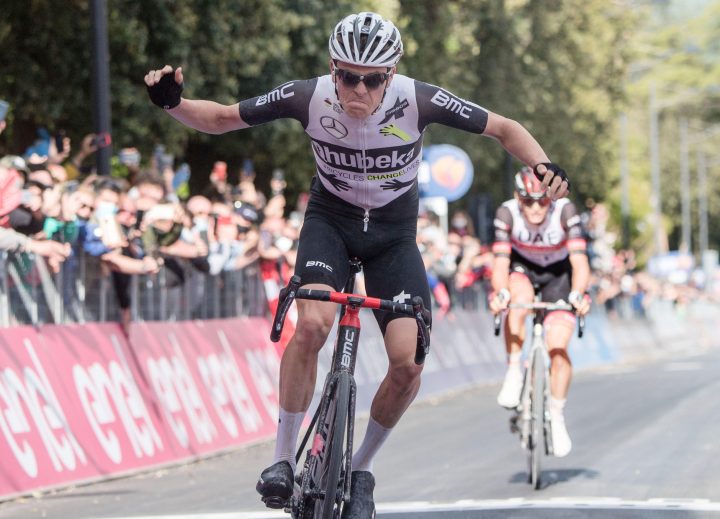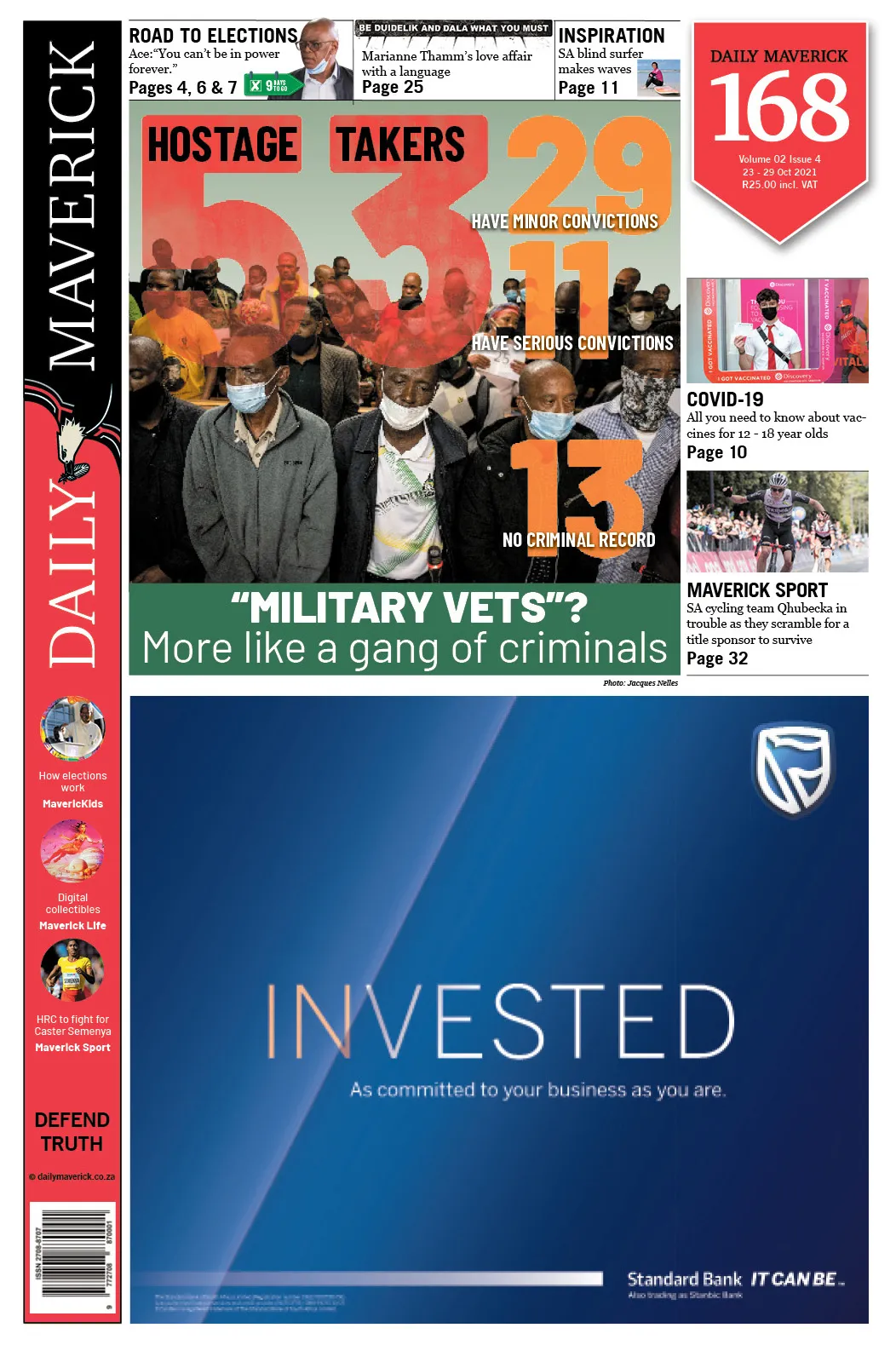CYCLING
‘Africa’s Team’ fights for World Tour survival after funds dry up

South African-owned Team Qhubeka NextHash, the only team from the continent on cycling’s ‘first division’ tour, faces the very real possibility of folding as it battles to find a sponsor.
‘There is no pill for stupid,” said Doug Ryder, principal of Team Qhubeka NextHash, with a wry tone, about his own personality. It is about 48 hours after Ryder completed the Amsterdam Marathon and he’s in pain. But pushing his body is how he copes with mental stress. And Ryder, the force behind establishing “Africa’s team” in the elite pelotons of the world, is under more stress than ever.
His team, which employs 55 riders and more than 90 staff, is facing a crisis to survive. They need a major sponsor to come up with between €3- and €5-million (about R90-million) to keep them on the roads next year.
So, even though he hadn’t really trained to run a marathon, Ryder pounded the streets of the Dutch capital as ideas swirled in his head. His body is paying for it, but his strong mind and his tenacity from years as a pro cyclist, and more years hustling to keep his team in business, remain.
“The pain I’m suffering physically is nothing compared to the mental pain I have been through recently,” Ryder told DM168 from Holland.
“We really thought that by now the impact of Covid would have dissipated as people were vaccinated, business would open up and people would be more confident about investing. But that hasn’t really happened.
“Corporates haven’t been open to becoming involved in cycling and there are fewer wallets out there as big companies acquired smaller companies. The irony, though, is that cycling has never been more popular. Bike sales and the industry are booming. People want to get out of their cars and use bikes more often. There are more fans of cycling, but it’s not easily translating to sponsorship.
“Viewership of the Tour de France has gone up 40% in recent years, and road cycling remains the F1 of the sport because it has history and legacy.”
For Qhubeka NextHash to continue on the journey on the World Tour – the premier men’s elite road cycling tour – they will need a minor miracle because the final deadline to register the team for 2022 with the sport’s governing body, the Union Cycliste Internationale (UCI), is 15 November. If they don’t meet that deadline and prove that they are a viable, solvent team, they will lose their licence – which they’ve held for a decade.
“The worst-case scenario is that the team folds,” Ryder said matter-of-factly. “That would be crazy because we are established. We have done seven Tour de Frances and we’ve been in the second and first division of the sport for 10 years.
“What we will do in that scenario is keep our Continental team going with the funding streams we have. There is also an option we could keep going as a second division [UCI ProTeam] and then rely on wild cards into big races. There is a lot of popularity around the team and, because of our diversity, organisers want us in races.
“The cost of keeping a first-division World Tour team, with 27 riders and all the attendant staff and logistics, is very high. It’s one of the only sports in the world where you pay more to be in the elite division.
“We were unable to provide the UCI with the right documents at the first gate, which was provisional registration on 19 October, but I was surprised to see there were only 16 second-division teams registered. That is a low number and underlines how difficult the sponsorship market is out there. But the amount we need is not huge in the context that we are a World Tour team with a guaranteed entry into the three Grand Tours: the Tour de France, Giro d’Italia and Vuelta a España.”
Bankrolling a passion
Cycling’s professional structure is antiquated in some ways. Teams are at the mercy of sponsors. In the early years of professional cycling, wealthy individuals funded teams. That evolved into corporations bankrolling professional outfits.
Ultimately, though, the decision to fund professional cycling teams comes down to someone, in a high place, who has a love of the sport.
In the modern world, with so much television and media coverage, there is a lot to be gained for savvy corporates backing a team. That is why Qhubeka’s struggles to find a backer are in some ways mystifying.
The team has raised the profile of the sport on the African continent and helped grow interest in the traditional races, which are almost all held in Europe.
Like the American 7-Eleven team of the 1980s, which brought a bunch of American riders and sponsors to Europe, and paved the way for the likes of the now-disgraced Lance Armstrong, Qhubeka has opened a similar door to Africa.
The team has always had South African and African riders on its roster, such as Eritrea’s Daniel Teklehaimanot, who was a top 50 finisher in the Tour de France. The UCI’s decision to hold the 2025 Cycling World Championships in Rwanda is partly because of Team Qhubeka’s influence on globalising the sport.
“Seeing Biniam Ghirmay from Eritrea come second in the Under-23 World Championships this year was incredible,” Ryder said. “He was just 14 years old when Teklehaimanot wore the King of the Mountains jersey in the 2015 Tour de France with our team. Their stories, as well as the journey of Nicholas Dlamini from the townships in Cape Town to the Tour de France, are inspirational.”
Big dream
Ryder, who has run and owned the team since 2007, has always had to hustle to keep it on the road.
As a struggling pro cyclist in the 1990s, it was at the 1996 Atlanta Olympics where Ryder’s idea for an African team on the World Tour took shape. More specifically, it was fellow South African Josia Thugwane’s gold medal run in the marathon that lit the fuse.
“Watching Josia win, I thought that if Africa could produce the best endurance runners, why couldn’t it produce top cyclists?” Ryder recalled. “Africa is a continent of people who walk. If you’re too poor to afford a car, you walk.
“I thought that if we could create a hero on a bicycle, then it would make the bike cool across the continent. That was a pipe dream back then because I had no business experience. After that, I spent 11 years in the corporate world with IBM and Microsoft, which helped me understand that world. I sold multimillion-rand sponsorships and built relationships for a living, which I think I’m pretty good at.”
As Team Dimension Data, the team partnered with the Qhubeka charity with the aim of putting people in poorer areas on bicycles. And they have made a remarkable impact on that goal, raising funds for more than 30,000 bicycles for distribution to Qhubeka programmes in South Africa.
But the charity component can only survive if the professional team remains competitive on the World Tour, winning races and stages at events such as the Giro d’Italia and the Tour de France. And being there costs money.
At the end of 2020, nine months into the first of two Covid-affected years, Qhubeka lost primary sponsor NTT. The Japanese telecoms giant had acquired Dimension Data, which previously funded the team. Within a year, the cycling programme was cut from the budget.
Ryder, ever the salesperson, found a partner in Swiss sports apparel maker Assos and then cryptocurrency company NextHash to keep the team going. But those are not long-term deals with big budgets that will sustain and build a team into a competitive unit over years. Teams such as Ineos (formerly Sky) and Jumbo Visma operate on annual budgets of between €25- and €30-million (about R425- to R510-million) a year.
Others, such as Team UAE, which is backed by the oil-rich emirate, may have a smaller budget, but can unofficially tap into an almost endless stream of money.
Sponsors such as Mercedes Benz, bike maker BMC and clothing brand Burberry are sticking with the team, but their support comes in the form of much-needed products. Salaries, hundreds of flights and thousands of hotel room fees need to be paid. Of the 19 World Tour teams, cycling’s equivalent of football’s Premier or Champions League, Team Qhubeka NextHash is operating with the least funding. And it is significantly behind the 18th-poorest team.
Keeping riders
The uncertainty means that retaining the best riders is going to be a challenge. The team created a stir when it captured three stages in a week at the 2021 Giro d’ Italia. Stage 11, 13 and 15 – two hilly and one flat – were won by three different riders from Qhubeka. No other unit had won more than two stages in the race at that point, and, from almost nowhere, the little team that could was the talk of the cycling world.
Switzerland’s Mauro Schmid, Italy’s Giacomo Nizzolo and Belgium’s Victor Campenaerts were the riders who won for the cosmopolitan Qhubeka outfit, but it was a massive team effort to deliver them to the line in the position to fight for victory.
Those three riders are all improving and are going to win many more races. The hope is that it will be in the colours of the South African team in 2022 and not a rival outfit. DM168
This story first appeared in our weekly Daily Maverick 168 newspaper which is available for R25 at Pick n Pay, Exclusive Books and airport bookstores. For your nearest stockist, please click here.



















 Become an Insider
Become an Insider
Comments - Please login in order to comment.